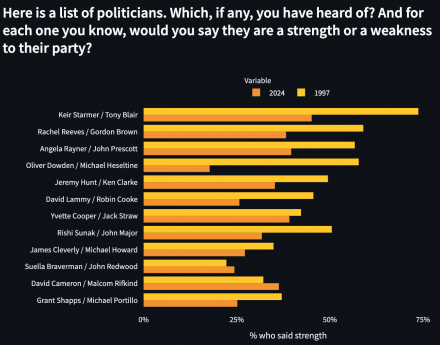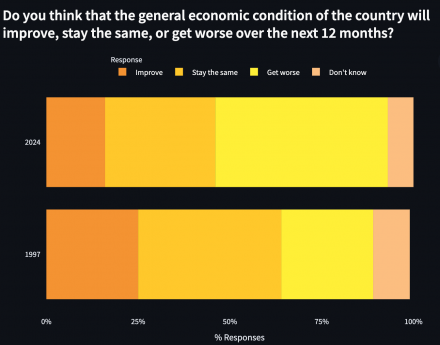
It’s so obvious that it barely needs saying, and yet it’s truly fascinating. On just about every metric, 1997 is not at all like 2024.
It’s not just the passing of time that means parallels between Tony Blair’s famous landslide and this year’s election are hard to identify, the country’s entire political and economic outlook (apart from the polling) is utterly, utterly different.
This is the key finding from a major piece of analysis published yesterday by Public First (where I am a partner) that paints a multidimensional portrait of then and now.
We found that voters in 1997 who believed that things could only get better were in fact probably right. Britain’s economic position was in good nick (productivity was at 4.9%) and its national finances were not a car crash – public sector debt was 37% of GDP, compared to 98% today.
On many levels things were already looking up even before Blair’s triumphant arrival in Downing Street.
‘Voters aren’t itching to skip around to D:Ream’
The Labour party’s polling was seemingly even better than that being enjoyed by Labour today too. If you get under the surface of current trends and contrast them with 1997 the difference is quite striking.
For example, more people thought favourably of Blair, John Prescott and Gordon Brown than think the same way about Keir Starmer, Angela Rayner and Rachel Reeves in 2024.

This is hardly surprising given the strength of national pessimism that we see in Britain today. In the focus groups that Public First also runs we find normal people really struggling to imagine a better version of the country than the one we have now, wallowing in debt and depression.
We don’t find voters itching to get out of their chairs and skip around to a D:Ream earworm.
But then can you imagine Starmer jumping off the sofa to bust some moves to some mid-90s dance-pop chart-topper? Thought not.
This goes some way to explain something altogether most positive that we’re also seeing in our focus groups. Voters are relaxing into the idea of the 2024 leader of the Labour Party as Prime Minister.
We are finding voters who believe that Starmer will make a decent PM, who will inherit a country in a mess, but who is likely to try to do a decent job of turning things around.
‘Voters don’t want unrealistic promises’
It absolutely isn’t politics with a rock and roll anthem as its backdrop. What people are getting behind is the idea of a Starmer government as the antidote to the omnishambles of too many years of Tory government experimenting in dangerous economic policies while simultaneously indulging in dangerously divisive culture wars.
Voters want NHS waiting lists to be brought under control, economic policies that don’t risk a run on the pound and that are likely to ultimately bring down the cost of living and they’d like crime and immigration to be managed properly.
They don’t want unrealistic promises – they don’t believe them. Starmer’s language and speeches recognises this need for realism. 10 years of national renewal is a realistic time horizon.

It’s worth remembering that part of the attraction of Blair was excitement. Setting to one side the brown envelopes of cash for questions, the really stark contrast in 1997 was the technicolour and razzmatazz of New Labour against the man of grey who Spitting Image had counting the peas that went with his meat and two veg.
2024 is oh so different. Voters won’t want to be told that a new dawn has broken on the morning of a historic electoral victory. They will want to be told that they have a decent man in No 10 who will take the problems of Britain seriously and try to fix them.
Our research project told us that Britain in 2024 is unrecognnisable from 1997. It’s a bloody good thing that the Labour’s leader is a different kind of politician too.
If you have anything to share that we should be publishing about this or any other topic involving Labour, on record or strictly anonymously, contact us at [email protected].
Sign up to LabourList’s morning email for a briefing everything Labour, every weekday morning.
If you can help sustain our work too through a monthly donation, become one of our supporters here.
And if you or your organisation might be interested in partnering with us on sponsored events or content, email [email protected].




More from LabourList
‘Factionalism at the top is weakening Labour – and handing a gift to Reform’
‘Europe must stand strong on its own as US security guarantees grow conditional’
‘Tackling poverty should be the legacy of Keir Starmer’s government’